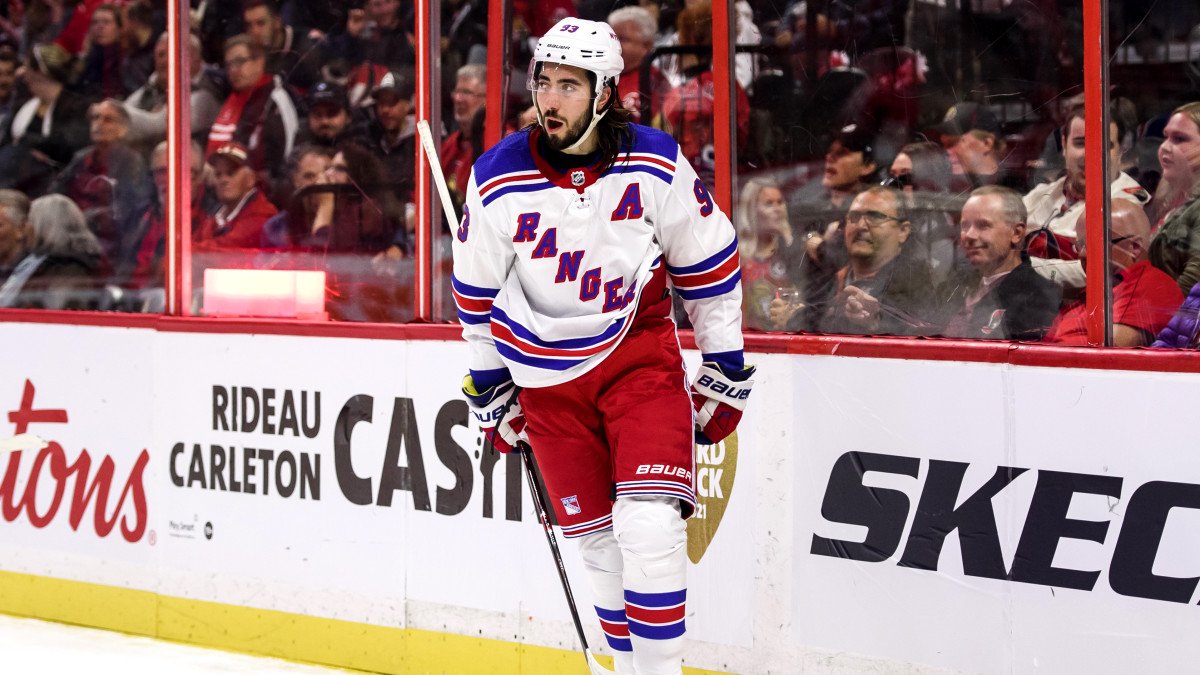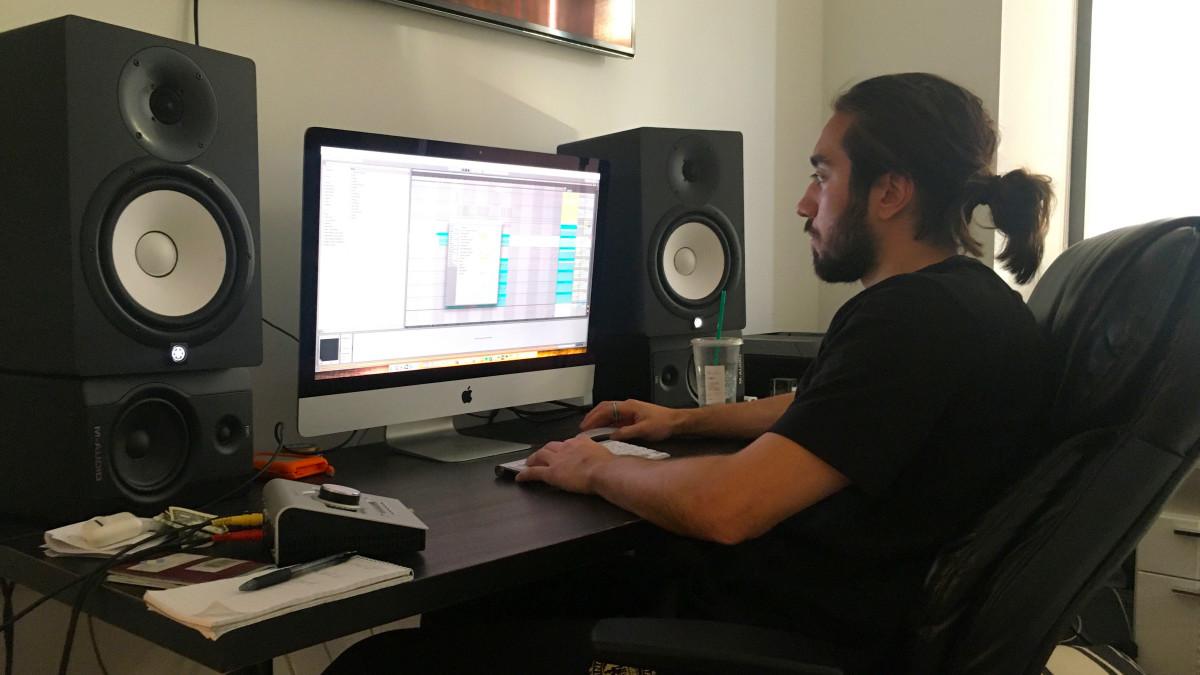DJ Zibanejad: Inside the Musical World of the Rangers Star


Thirty-six stories above Midtown Manhattan, afternoon sunlight bathes the corner apartment inside this luxury tower. A small hookah is perched on the windowsill; the coffee table displays a paperback novel translated into Swedish as well as some candles made in Stockholm; and two pairs of slippers sit in front of the door leading to a massive balcony. It is a peaceful aesthetic all things considered. Except, perhaps, for the pulsing bass lines barreling from the guest bedroom.
“I try to keep it not too crazy in here,” Mika Zibanejad explains amid the din. “I haven’t gotten one noise complaint, though, so it’s working out.”
He is seated behind a desktop computer, eyes darting across a dizzying array of music chords on the screen, fingers tapping along to the beat. In fact, many things are “working out” just fine for Zibanejad these days. Not only did the 26-year-old center recently join Rod Gilbert as the only New York Rangers to notch eight points through the team’s first two games, building off a breakout ‘18–19 season in which he led the Blueshirts in nearly every offensive category. But in late August he received a video from a friend that revealed some mind-blowing news: Tiësto had played one of Zibanejad’s tracks at the Summerburst festival back home in Sweden.
It is one heck of a passion project, as passion projects go. Since 2017, Zibanejad has produced and released four songs that collectively average more than a quarter-million listeners on Spotify each month, not to mention the umpteen more fans who attend his various deejaying gigs over the summer. And it wasn’t out of sheer goodwill when fellow Rangers asked Zibanejad to hit the turntables for their Halloween and Christmas team parties; ditto for goalie Henrik Lundqvist and his past two annual charity events. “It’s awesome, it’s fun,” Rangers forward Chris Kreider said after practice earlier today in early October. “He’s a pretty talented dude.”
Framed by four subwoofer speakers, hand hovering over a volume dial, Zibanejad queues up another melody on Ableton, the digital audio software that he uses. Most of his musical work is done at home like this (even though fellow Swedish teammate Lias Andersson is crashing in the guest bedroom this season, therefore restricting studio time). But ideas have been known to pop into Zibanejad’s mind at random, like along the West Side Highway to the Rangers practice rink, or on the five-minute walk between his apartment and Madison Square Garden. So Zibanejad will whip out his phone, hum the tune, and transcribe the notes later.
“Some make sense,” he says. “Some make absolutely no sense. It never sounds great.”
But it always gets better. After all, Zibanejad doesn’t half-ass anything. Certainly not on the ice, where he is averaging nearly 22 minutes per game on the Rangers’ first line, first power play and first penalty kill, a career-high. “Consistently tenacious,” Kreider says. And clearly not with music, where the same creativity and work ethic that has fueled his fiery start to the ‘19–20 season are mixing together to produce some pretty hot jams.

***
As a kid, Zibanejad wasn’t that musically talented. He remembers taking interest in piano and guitar, but his school in Sweden was apparently full of talented pianists and owned no left-handed guitars. (Even though Zibanejad shoots right, he plays left.) Slightly discouraged, Zibanejad settled on drums. “It was nothing I felt like pursuing, having a career being a drummer,” he says. “Hockey took a lot of time. But it was always fun to have those classes.”
The spark came later thanks to his older brother—and current agent—Monir Kalgoum, a former pro hockey player in various European leagues. One summer, Kalgoum returned to their hometown and took up deejaying to make some extra scratch. Then a teenager, not long before the Ottawa Senators would draft him sixth overall in 2011, Zibanejad was hooked from the first time that he messed around on Kalgoum’s mixer and turntables. “I like that I picked it up really quickly,” he says. “But it wasn’t a phase, which I thought it would be. It’s still here.”
The hobby really took hold when Zibanejad joined the Senators’ AHL affiliate in Binghamton, N.Y., during the ‘12–13 lockout. Eager to build off what his older brother taught, he bought a deejay set and computer software and began watching how-to videos on YouTube. He still has some of his earliest songs saved and relistens to them every so often. “It sounded horrendous,” he says. “It was not good. It sounded like a bunch of noise. Nothing is in place. You can hear that there’s an idea in some. And in others I don’t really know what I was thinking.”
Fortunately, Zibanejad had help. Upon joining Ottawa, where he would spend four seasons until moving to the Rangers in a July 2016 trade, he quickly made contacts in the industry. One of these was songwriter/producer Elijah Woods, who studied at nearby Algonquin College and tutored Zibanejad in the music-making process. Other deejay friends have been just as valuable resources, offering feedback whenever Zibanejad sends over his latest work-in-progress.
His first two songs, “Forever” and “Can’t Go Back Home,” were released in 2017. “Nobody,” featuring Zibanejad and a group called Hot Shade, came out the following year and now boasts more than 11 million Spotify plays. Along with Swedish deejay Mike Perry, they reunited for another track, “Moves,” which debuted earlier this year. Together the four tracks cover a wide range of genres and sounds, from the classic synthesizer trappings of modern house music to old-school swing samples and pan flutes. “I like to stick out,” Zibanejad says, “because you feel like, either this is going to be a hit, or it’s going to be s---. It’s a risk that I’m willing to take.”
The project that Tiesto played was the result of a collaboration with several friends; Zibanejad had barely touched it after originally writing the melody four years ago, until the friends heard a sample and asked to work together. With a little more back-and-forth, cleaning up bits here and there, he aims to release “Poison” next summer. “It just gives me goosebumps and chills when I see this,” he says, pulling up a video of the Swedish deejay’s performance. “But obviously I’m not 100% happy with the way it sounds yet.”
All told, Zibanejad estimates that he has 50–60 songs saved on his computer today. Some are half-baked melodies, others fully formed festival tracks, ranging from catchy radio pop tunes to house music best suited for basement clubs with strobe lights. Most have random file names, such as “weird ass melody project” and “drake maybe?” But almost none have been deleted.
“It’s cool to browse through the music I’ve done and see if there’s an idea, or a melody, or some chords I can use now,” Zibanejad says. “There’s some stuff in there that I still like and go back to and regret that I didn’t release. But it’s like everything: You have to practice. I can hear things in my songs that I do better now. It’s solid, fun progress.”
***
Here is another sign: Zibanejad crammed inside a deejay booth, crouched down and hiding from the crowd. It was last July and Zibanejad was minutes away from playing for a packed nightclub south of Stockholm. “And people were hanging on this booth,” he recalls. “Everyone sang along the whole night. It was awesome. Something I’ve only seen and been a part of as a crowd, not as a deejay. That was pretty cool, to understand how hype that is, to be on the other side.”
Zibanejad played five gigs last summer—down from 10 in 2018—but two stand out for similar reasons. The first was that nightclub, Club Monday, where capacity was exceeded by several hundred and everyone hollered themselves hoarse over an hour and a half. The second was the Summerburst festival in Gothenburg, which took place at the country’s largest outdoor arena. Why so special? “I miss the buzz from playing and scoring goals and winning,” he says. “You get that crowd’s reaction, you get that adrenaline kick like you do in hockey. Even though during summer it’s a good time to get away from hockey, I’m happy I can maintain that in music.”
There are other comparisons to draw between his two prime pursuits. Creativity, for instance. “When I deejay, I prepare what I want to play, but you’re always ready for something else,” Zibanejad says. “You look at the crowd, look at how they react. Same thing for hockey.” Whether baiting defenders into overplaying the puck before dangling past them, or stick-lifting opponents to vulture possession before heading on the counterattack, Zibanejad wreaks havoc for the Rangers thanks to his “bag of tricks,” as Kreider puts it. “Interesting brain,” Kreider says. “It goes beyond the skill. It’s the way he thinks and applies his skill. And the way he works.”
Indeed, it must also take a special drive to handle checking fellow Metro Division centers like Sidney Crosby and Nicklas Backstrom while still maintaining the energy to worry about proper harmonies and time signatures. “People know him as a really good skilled player, fun-loving kind of guy,” Rangers teammate Brendan Smith says. “But it’s what he does without the puck—he’s hard, he grinds, he hits, he’s physical, he wins his one-on-one battles—that’s ultimately what I love about his game. It’s easy for our young guys to pull from watching him and learn because he does it right on a daily basis and enjoys the game. That’s a testament to him. That’s why older guys like me gravitate toward him, as well as why younger guys want to be like him.”
If music connects Zibanejad with his day job over the summer, though, it is the opposite during the regular season. “It’s an escape from everything, when it’s a lot with practice and the games and everything that’s going on, good or bad, to get away and make some music,” he says. But the worlds blend every now and then. Though Zibanejad typically protests whenever fellow Rangers attempt to play his songs in the locker room, the team coaxed him into mixing the player intro song for its ‘18–19 home opener. Sometimes he also shares ongoing projects with players to gauge their reactions. “The downside is I get questions about when it’s going to get released,” he says. “That’s just the way it goes, I guess.”
The focus group returned this season with a host of new additions, including Artemi Panarin, the new winger on Zibanejad’s line opposite Pavel Buchnevich. (“For the whole team, it’s been unbelievable to get a player like him, of that caliber,” Zibanejad says.) It has been months since Zibanejad last sat down for a producing section, but he has a series of collaborations that will hopefully turn into new songs by next summer. He doesn’t plan to book any new gigs until after the season is over, hesitant to even have a date on the calendar as a potential distraction.
“I’ve put a lot of hours into it,” Zibanejad says. “But it’s been a lot less than a regular artist, because of hockey. It’s fun to see the journey, without the same sacrifice, in that sense. I think it’s maybe easier for me because of the non-existing pressure of having to release things, having to make music, keeping the label happy, keeping the fans happy. I do it because I love making music. If people like it? Awesome. If there’s 10 people listening or 10 million? I don’t care.”
A pause and a smile.
“Obviously, it’s more fun if there are 10 million people listening to the song.”
